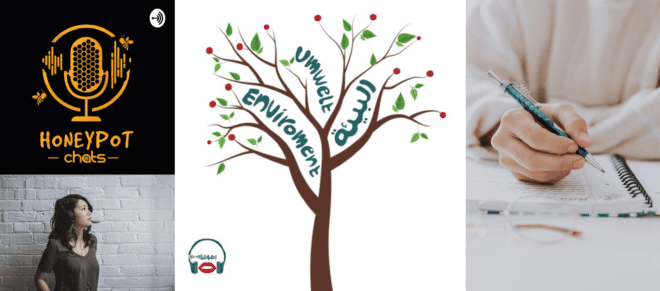How Do Podcast Listeners Meet A New Podcast

I’m a process person, someone who loves sharing and hearing about other people’s creative processes–not just what they do but how they do it. I also want to know what the journey is like along the way. And although there are many tweets, articles and newsletters that share podcast reviews and recommendations, not many of them share the step-by-step listener process. I crave a play by play of what a podcast listener things, feels and experiences when they first listen to a new podcast. This article is an attempt to document my own podcast listener process as I listen and react to two new podcasts.
Let’s get started.
Podcast #1: Honeypot Chats
Podcast description: “Breaking down cybersecurity concepts and information in ways that people can understand.” Yeah, you and I will both discover that this very professional description does not even remotely encompass the exuberant personalities of the podcast co-hosts. It does adequately summarize the content but not the feel of the podcast.
How did I find this podcast?
For this podcast, I searched for technology podcasts in the African Podcast Database, created by the Africa Podfest folks. Africa Podfest is a groundbreaking podcast conference that highlights podcasts and podcasters on the African continent. The database is one of the valuable resources that they’ve created out of this community of podcasters. You can search for podcasts by topic, location and other factors.
Why did I pick this podcast?
I scanned the 17 podcasts that came up in a “technology” search in the database. I was curious how the name “Honeypots” connected to technology, so I followed their link in the database over to Instagram. There I saw a more catchy description of the podcast that pulled me in:
“Two Zambian chicks simplifying Cybersecurity one listener at a time 🍯🐝”
This image in their Instagram grid also caught my eye.
It felt like these were two no nonsense and friendly women who wanted to help me understand cybersecurity. For me, a host’s personality and voice are really important. All the information and episode scripting won’t help if I don’t emotionally click with a host. Trust me, I’ve tried to force it. In this case, I felt like there was a personality match. So I started by listening.
What did I listen to? What did I hear?
I usually start listening to the most recent episode with a new podcast. Exceptions, for obvious reasons, are audio dramas and other series that make more sense listening to in order. With Honeypots, I could have started with the most recent episode but I was on a search for the podcast name information. So instead, I dug back into the earlier episodes and started with their first episode.
This introductory episode started with a bit of music and then they dove into the podcast why immediately. This was great. No time was wasted wondering why this podcast exists. Brenda and Tambi, the Co-Hosts, both work in cybersecurity and explained how often they needed to explain these concepts to people. They also said that they want to highlight women in cybersecurity because these are lesser heard voices in the field. The conversation flowed really naturally between them and I felt like I was listening to two friends geek out over a tech topic that they were passionate about. And, of course, they shared why the podcast had this name. No, I’m not going to spoil that for you!
Read more: Upgrade Your Writing Business in 2021 with These Podcasts
Podcast name satisfied, I dug into a more recent season of the podcast. I listened to season 3, episode 9 from August 2021. This episode, as you can see from the title above, was about working from home. Almost immediately I learned the term “cyber pandemic”, which was the increase in cyber attacks at the beginning of the work from home trend at the beginning of the pandemic. Hackers apparently took advantage of these work from home folks who weren’t diligent in protecting company data on their company devices.
It’s been almost two years since the pandemic started but this is the first time I’ve heard this phrase. That feels weird. Did I miss it? Or are these two women that far ahead of the curve? Don’t get me wrong, this was not a fear inducing episode. Instead, they spent the time giving practical tips on what we should be doing to protect that company data as well as our own when working from home. This is not just interesting content, it’s really valuable for individuals and companies globally.
These two episodes are a small part of what Brenda and Tambi are doing on Honeypot Chats. They also have episodes with news, more tips and interviews with a specific focus mostly but not entirely on Zambia and Zambians. But as you can see from this episode 9 example, a lot of the information is relevant to those of us outside of Zambia as well.
What did I think?
In English language Western media, I don’t often read or hear about technology on the African continent in general, let alone in Zambia, so this podcast really excited me. The fact that the information is also really practical to those of us outside of Zambia is a plus as well. But honestly, I would keep listening either way. Finally, as a woman that studied technology in college, I love that they’ve interviewed so many women in the space. Overall, I clicked hard with their content. I followed/subscribed to the podcast and their social media channels. I want to know both what episodes come out and what they have to say about them and other technology issues. I’m invested in this duo!
Podcast #2: Aswatona Podcast
Description: “Our voices is a project that aims to connect and support podcasters within the WANA (North Africa and West Asia) region and Germany. Together we will produce 12 podcasts in Arabic, English and German around the topics environment, gender and power dynamics.”
How did I find this podcast?
Aswatona Podcast hosted a live event recently where they chatted with some of their creators.
Why did I pick this podcast?
I lived in Germany for most of 2020 and learned a lot about the Arabic speaking population living in Berlin while I was there. Podcasts are a very real way that I like to build on prior knowledge so this podcast appealed to me on this level. Additionally, multilingual podcasts are something I’m very intrigued with. The time, energy and sensitivity that goes into doing this is nothing less than heroic.
What did I listen to? What did I hear?
First I listened to this climate related episode:
There were two main male narrators for this episode and many guest voices as well. The guests talked about environmental issues in their region or country. The mix of people and places was really interesting but the music, if I’m completely honest, was very distracting. It was hard to hear the people talking sometimes. Also, I’m not sure what the call-to-action was. It could have gotten drowned out in the music but I don’t remember them proposing a solution to these issues. I’m drawn to shows that not only show a problem but suggest at least the beginning of a solution, no matter how small that step may be.
To get a sample of the different categories of shows on this podcast, I then listened to this gender episode:
This episode started out with a male narrative, Sadeq, asking,
“Do women own their bodies? Being a man, I completely own my body, my freedom. As a guy, do I have the right to talk about their bodies, their stories?
The women in this episode were honest and bold. They shared their body shame in very tender yet, for obvious reasons, painful details. “It’s not only about bodies,” one of the women went on to describe, it’s also about their emotional and mental health. There were many stories of the emotional and intellectual struggles that women in the Arab world face because of the tradition of their father and then their husband “owning” their bodies: “9 out of 10 women said that ‘marital rape’ does not exist.” This statement, this statistic will stick with me for a while.
What did I think?
With regards to the body narrative episode, I’m having a strong reaction to a male voice introducing and wrapping up the episode. These women have very strong, sad stories of patriarchal attitudes in their culture. So why is a man the one to shepherd the stories in? This was a reaction I could not shake.
But another part of me knows that many men won’t listen to these stories unless they’re introduced by a man. This is almost as sad as the stories themselves but also a powerful storytelling choice. I got very invested in this episode. Many of these stories are unfortunately not unique to Arab culture but I tried my best to listen. Saying that these attitudes are globally dominant distracts from these women’s admissions. Their trust in our ears. Their faith that things can change if they are talked about. I’m skeptical, jaded and now that I’ve experienced their voices, their stories, I’m also protective of these women that shared a piece of themselves.
I would listen to more of this podcast for sure. I might lean more towards listening to the gender episodes since I connected with these more but I might venture to the other topics of environment and power dynamics if the title or episode description was appealing to me at that point. Overall, I’m very glad that podcasts like this exist. Hearing about a culture from within that culture, instead of as reported by someone from the outside, feels more powerful, more authentic, more nuanced. It’s naturally hard to get this level of nuance unless you’re swimming in the culture.
It was a lot of fun to track my own listening journey while meeting these two podcasts. I’m sure that your listening journey may differ from mine but one thing is certain: podcasts are personal, powerful and intimate. They affect us more than other mediums for these very reasons and that’s a wonderful thing indeed.













Comments
Comments are closed.